Clifford Garstang's Blog, page 86
February 10, 2013
AWP HEAT Flash Contest — Free to Enter!
Guidelines
The AWP HEAT Flash Contest is run in conjunction with AWP HEAT, a reading on Friday, March 8, at Dillon’s Restaurant & Bar, Boston, 955 Boylston Street, one block Hynes Convention Center. Free. 2:30 – 6:30 p.m.
Winners of contest announced at 4:00 p.m. at AWP HEAT.
Respond to this prompt: “Fire”
Anyone may enter the contest, whether attending AWP or not.
One entry per person.
Entries must be 1,000 words or less.
Email entries to awpheatflashcontest@gmail.com as a doc, docx, or rtf file.
Stories may be submitted anytime between now and midnight March 1st EST.
Up to three winning stories will be published by JMWW, Prime Number, and Corium.
The contest will be judged by Shaindel Beers ( The Children’s War and Other Poems ), Cliff Garstang (What the Zhang Boys Know), and Bonnie ZoBell (The Whack-Job Girls). Winners will receive copies of these books.
February 9, 2013
Happy Year of the Snake! 新年快乐!
 The Lunar New Year begins Sunday, February 13, and this year will be a Year of the Snake. (Click on that link for all the details about the Year of the Snake.) Has HanBan.com says,
The Lunar New Year begins Sunday, February 13, and this year will be a Year of the Snake. (Click on that link for all the details about the Year of the Snake.) Has HanBan.com says,
The Snake is the sixth sign of the Chinese Zodiac, which consists of 12 Animal Signs. It is the enigmatic, intuitive, introspective, refined and collected of the Animals Signs. Ancient Chinese wisdom says a Snake in the house is a good omen because it means that your family will not starve.
This is my year, as I was born in another snake year.
Happy New Year! 新年快乐!恭喜发财!
One Night Standing — Sunday, February 10
 I am really looking forward to heading down to Roanoke on Sunday evening for One Night Standing, a great new reading series at the Kirk Avenue Music Hall hosted by the Jackson Center for Creative Writing at Hollins University.
I am really looking forward to heading down to Roanoke on Sunday evening for One Night Standing, a great new reading series at the Kirk Avenue Music Hall hosted by the Jackson Center for Creative Writing at Hollins University.
I will be reading along with poet Leah Naomi Green and journalist Ralph Berrier. An Open Mic will follow an intermission. For more information check out their website at One Night Standing.
February 6, 2013
2013 Reading: The Round House by Louise Erdrich
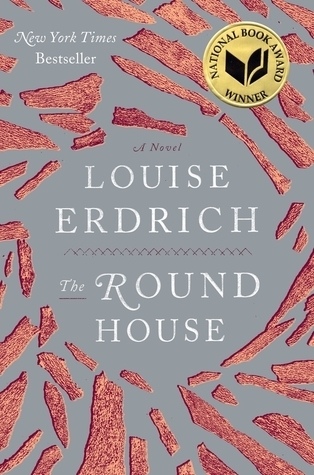 The Round House by Louise Erdrich won the National Book Award in 2012. I haven’t read the other finalists, so I can say whether I agree with the choice or not. I can say that the book is satisfyingly complex, with dense, thought-provoking issues.
The Round House by Louise Erdrich won the National Book Award in 2012. I haven’t read the other finalists, so I can say whether I agree with the choice or not. I can say that the book is satisfyingly complex, with dense, thought-provoking issues.
The story is narrated by Joe, a 13-year-old Native American. His mother is raped and Joe and his father, a tribal judge, attempt to solve the crime, dealing with fuzzy jurisdictional questions and ultimately with questions of revenge and justice.
I don’t love books narrated by kids, but this Joe doesn’t seem much like a kid to me. His parents–father, especially–entrust him with information and the responsibility that goes with it. And for the most part he handles it well.
The story is told retrospectively, so we learn a little about Joe’s present life as the story of that one summer unfolds.
Definitely an entertaining read, and one that is likely to stick with me.
February 5, 2013
The New Yorker: “The Embassy of Cambodia” by Zadie Smith
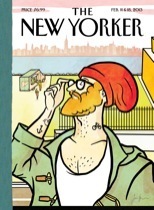 February 11, 2013: “The Embassy of Cambodia” by Zadie Smith
February 11, 2013: “The Embassy of Cambodia” by Zadie Smith
I have mixed feelings about this story. On the one hand, I like the character of Fatou, an immigrant from the Ivory Coast who is working as a maid for a Pakistani family in London, and the difficult position she’s in makes for compelling fiction. I also like very much her observation of the Embassy of Cambodia as she passes it each week on her way to the pool for her swim. On the other hand, the point of view from which the story is told seems wrong for this story. Smith has chosen the “tribal” perspective—third person plural—as if the people of this neighborhood would even notice Fatou, much less understand what’s going on in her head. There’s a certain amount of back and forth between the third person plural and a more traditional third person account of Fatou’s consciousness, but then there are places where the two are mixed. It just seems odd to me.
As Smith explains in the Q&A with Zadie Smith, the structure of the story follows the badminton game—21 sections, 21 points. They’re each labeled by a score: 0-1, 0-2, 0-3, and so on to 0-21. This suggests that one of the player scores no points. Is that Fatou? Perhaps, because she doesn’t seem to be doing too well, although she is getting some help.
Fatou has had it rough. Her father got her out of Ivory Coast and into a hotel job in Ghana when she was younger, but a hotel guest raped her. She then moved on to a job in Rome, and now London. But she’s treated terribly by her employers—she doesn’t even know how badly they treat her because she’s heard of girls who are treated worse. She has a Nigerian friend, Andrew, who speaks to her of his faith and also of the inevitability of suffering. (Andrew is an odd sort, and full of some bad information.) One of the things that is interesting here is the discussion of genocide—the Holocaust, the Khmer Rouge, Rwanda. Definitely worth considering and discussing further.
February 4, 2013
2013 Reading: Red Gold by Alan Furst
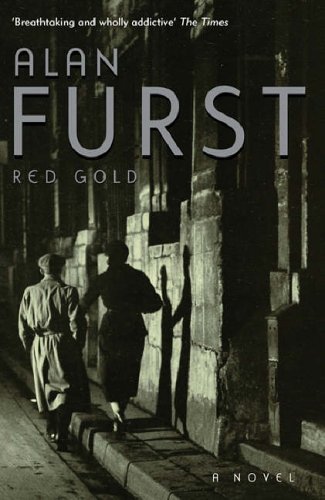 Red Gold by Alan Furst was a surprise to me because I’ve never read Furst before, although I’ve heard of him.
Red Gold by Alan Furst was a surprise to me because I’ve never read Furst before, although I’ve heard of him.
This novel tells the story of a former French filmmaker who, for a variety of reasons, becomes involved with the anti-German resistance during WW II. Except for the personal relationships that the protagonist maintains, with his ex-wife and another woman, the tale almost reads as pure history as we follow him through a series of exploits and narrow escapes.
I’ll need to read more Furst to see if I have a similar impression. In any case, it was definitely an enjoyable read.
February 3, 2013
Report from the Book signing at Fountain Bookstore
 Today was Local Author and Small Press Day at Fountain Bookstore in Richmond.
Today was Local Author and Small Press Day at Fountain Bookstore in Richmond.
We had snow last night, but it was disappearing by the time I had to leave Staunton, and the snow that had been forecast for this morning didn’t materialize. I did encounter a snow shower on the drive to Richmond, but it was nothing serious, and I arrived and found parking with plenty of time to spare. I even managed to get coffee and a pastry at the Urban Farmhouse Market & Cafe on Cary Street just a block from the book store.
There were four of us during the hour I was there: me, Pamela Kinney, William Sells, and an old friend, Jonathan Rintels. We had a steady stream of people chatting with us and buying books, and the time flew. Then it was time for us to clear out and the next “shift” to move in.
The bookstore owner, Kelly, was great to work with on this event. I would love to have had more time–people can’t necessarily come during a one hour window–but it was fun anyway. And of course I managed to acquire a few books while I was there . . .
And the drive home went fast because I’m listening to an excellent book in the car, about which more soon . . .
February 2, 2013
Tips for Writers: Blond vs. Blonde
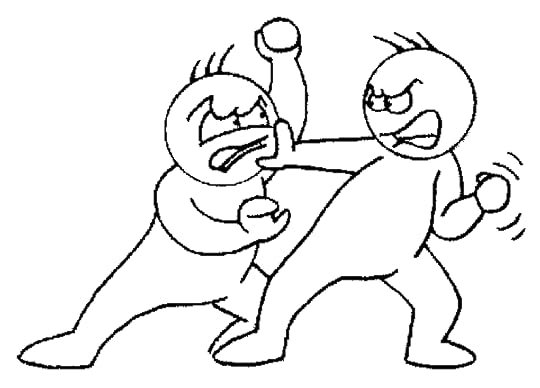 I’ve been having a rather unpleasant argument on my Facebook page today. Here’s how it began.
I’ve been having a rather unpleasant argument on my Facebook page today. Here’s how it began.
While editing a story for Prime Number Magazine this morning, I came across the adjective “blonde-grey,” which I considered wrong on two counts. First, in American usage, as I have learned, we don’t spell “blond” with an “e” (although we used to) when it’s used as an adjective. Second, in American usage, the spelling “gray” is more common than “grey,” which is more common in British English. So, I corrected the adjective to “blond-gray.”
Then, for fun, I posted this on Facebook: “PSA: In America, there is no ‘e’ in blond.”
Some people agreed, and some people challenged my assertion, either asking questions or saying I was flat-out wrong, and calling me arrogant for so pontificating.
Grammar fight!
But seriously, I also learned back in the dark ages that “blond” is masculine and “blonde” is feminine, both as adjectives and nouns. These days, almost all sources I have found say that the adjective form is “blond” (that is, never use “blonde” as an adjective). Some sources allow that the noun form depends on the gender of the person who is referred to. A man would be “a blond” but a woman would be “a blonde.”
These distinctions are carryovers from the original French and for the most part remain in British English. American English has been losing them over time, and in this case it is just about gone.
My source for all things usage-related is Garner’s Garner’s Modern American Usage, and here’s what Garner has to say on this controversy:
As an Adjective. In French, the –e is a feminine tag, the spelling without the –e being masculine. This distinction has generally carried over to BrE, so that blonde more often refers to women and blond more often refers to men. In AmE, though, blond is preferred in all senses.
As a Noun. Though we may from time to time see blond men and blond women in print, when we see a reference to a blonde (or a blond) we almost always assume it’s a woman. To avoid appearing sexist, it’s best to refrain altogether from using this word as a noun. In fact, some readers will find even the adjective to be sexist when it modifies woman and not hair.
There you have it.
It was a silly argument and my position hasn’t changed even one hair, blond or otherwise.
January 30, 2013
Events, Events, Events
 I’ve got lots of events coming up over the next few months. I’m grateful for the Events Tracker on this blog — it’s a great way for people (and me) to stay on top of what’s happening.
I’ve got lots of events coming up over the next few months. I’m grateful for the Events Tracker on this blog — it’s a great way for people (and me) to stay on top of what’s happening.
This coming Sunday, February 3, is Small Press Day at Fountain Bookstore in Richmond. I’ll be there from 1-2pm with a couple of other authors, and there will be signings in the store all afternoon.
On Sunday, February 10, I’ll be in Roanoke at One Night Standing, the terrific reading series that the creative writing program of Hollins University. That starts at 7pm at the Kirk Avenue Music Hall.
On Wednesday, February 13, I’ll be at Blue Ridge Community College in Weyers Cave, VA, to talk to students and faculty (and the public) and to sign books. That’s at noon in the College library.
March is even busier, but I’ll post those details later. I’ll be at the AWP Conference in Boston and I’ll do a booksigning there. I’m speaking to the Spring conference of the Virginia Outdoor Writers Association. I’ll be doing several events at the Virginia Festival of the Book, sitting on two panels and moderating one. Check the Events Tracker for details.
January 29, 2013
2013 Reading: Slaughterhouse-Five by Kurt Vonnegut
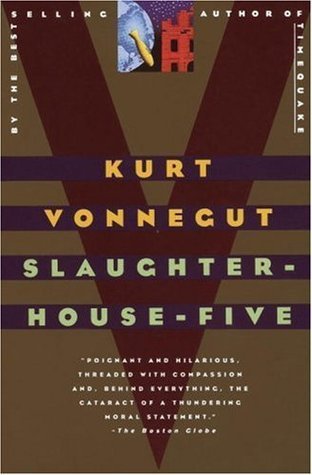 Slaughterhouse-Five: A Novel by Kurt Vonnegut is something I know I should have read a long time ago. I read some Vonnegut when I was young, but somehow I never managed to read this one.
Slaughterhouse-Five: A Novel by Kurt Vonnegut is something I know I should have read a long time ago. I read some Vonnegut when I was young, but somehow I never managed to read this one.
The book, as everyone probably knows, is about Billy Pilgrim, a soldier who is captured by the Germans during WWII and finds himself in Dresden during the bombing of that city near the end of the war. The narrator of the story was also there, just as Vonnegut was in real life. But the structure, by focusing on Billy, allows Vonnegut to go far beyond hat “really” happened.
Pilgrim experiences all times at once–before the war, his captivity in the war, life with his wife, after his wife’s death, his periods of hospitalization, and importantly, his capture by aliens. Time is something of an illusion, as is death.
And so it goes.






